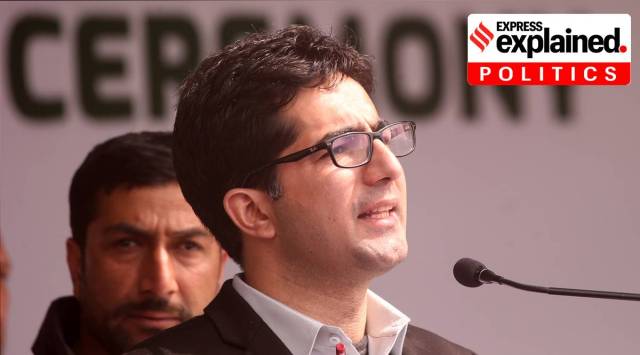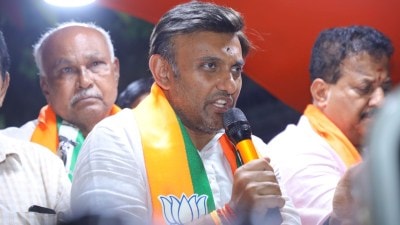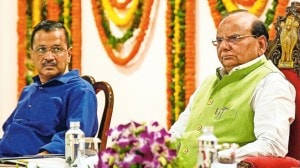- India
- International
Explained: Why Shah Faesal can return to IAS despite entering politics
Faesal's resignation had not been accepted by the government, pending the investigation into some of his posts on social media. That his resignation was never accepted means “the door is open for him” to rejoin the IAS.
 Shah Faesal has stepped down as president of the Jammu and Kashmir People's Movement (JKPM), and quit politics altogether. (Express Photo: Shuaib Masoodi)
Shah Faesal has stepped down as president of the Jammu and Kashmir People's Movement (JKPM), and quit politics altogether. (Express Photo: Shuaib Masoodi)A year and a half after he resigned from the Indian Administrative Service (IAS) in protest against the “unabated” killings in Kashmir, Shah Faesal this week stepped down as president of the party he founded, the Jammu and Kashmir People’s Movement (JKPM), and also quit politics altogether.
The resignation in January 2019 of Faesal, the first Kashmiri to top the Civil Services Examination, had not been accepted by the government, pending the investigation into some of his posts on social media.
That his resignation was never accepted means “the door is open for him” to rejoin the IAS, a senior government official told The Indian Express. He will, however, have to withdraw his resignation first, another official said.
What are the rules for resignation of an IAS officer?
Resignation is an intimation in writing by the officer of his/her intention to leave the service. Guidelines of the Department of Personnel, the cadre controlling department for the IAS, say that a resignation has to be clear and unconditional.

The resignation from service of an officer of any of the three All India Services (Indian Administrative Service, Indian Police Service and Indian Forest Service) is governed by Rules 5(1) and 5(1)(a) of the All India Services (Death-cum-retirement benefits) Rules, 1958. There are similar rules for other central services as well.
To whom must an officer submit his/her resignation?
An officer serving in cadre (state) should submit his/her resignation to the chief secretary of the state. An officer who is on central deputation is required to submit his/her resignation to the secretary of the concerned Ministry or Department. The Ministry/Department then sends the officer’s resignation to the concerned state cadre, with its comments/recommendations.
Last month, a principal secretary to the Punjab government submitted his resignation, but it was rejected by Chief Minister Capt Amarinder Singh.
Read | Shah Faesal interview: A perception was built that I am anti-national
What is the process after the resignation is submitted?
While dealing with the resignation, the state sees if there are any dues outstanding against the officer, and the vigilance status of the officer. Before forwarding the resignation to the central government, the concerned state is supposed to send information on these two issues, along with its recommendation.
The resignation of the officer is considered by the competent authority, i.e., the central government, only after the recommendation of the concerned cadre has been received.
The competent authorities are: Minister of State at the Department of Personnel & Training in respect of IAS, Minister of Home Affairs in respect of IPS, and Minister for Environment, Forest and Climate Change in respect of the Forest Service.
📣 Express Explained is now on Telegram. Click here to join our channel (@ieexplained) and stay updated with the latest
Under what circumstances is a resignation accepted?
The guidelines say that it is not in the interest of the government to retain an unwilling officer. As per the guidelines, resignation of a member from service is accepted, except in the following circumstances: Where an officer who is under suspension, submits a resignation, the competent authority should examine with reference to the merit of the disciplinary case pending against the member of service, whether it would be in the public interest to accept the resignation.
There have been cases in which resignations were rejected because there were disciplinary cases pending against officers. In such cases, concurrence of the Central Vigilance Commission is also obtained. It is also seen whether the officer had executed any bond for serving the government for a specified number of years on account of being given specialized training, a fellowship, or scholarship for studies.
Can a resignation be withdrawn?
The rule was amended in 2013 to allow a resignation to be withdrawn within 90 days of its acceptance. Rule 5(1A)(i) says the central government may permit an officer to withdraw his/her resignation “in the public interest”.
However, “Request for withdrawal of resignation shall not be accepted by the Central Government where a member of the Service resigns from his/her service or post with a view to be associated with any political parties or any organisation which takes part in politics, or to take part in, or subscribe in aid of, or assist in any other manner, any political movement or political activity or to canvass or otherwise interfere with, or use his/her influence in connection with, or take part in, an election to any legislature or local authority.”
What about withdrawal of resignation before acceptance?
The guidelines say that if an officer who has submitted his/her resignation sends an intimation in writing to withdraw it before its acceptance by the competent authority, the resignation will be deemed to have been automatically withdrawn.
Shah Faesal resigned on January 9, 2019, but his resignation is yet to be accepted. The DoPT website still shows him as a “serving” officer. This is despite the fact that he tried his luck in politics for a year and a half. DoPT sources said his resignation is yet to be processed – and he can withdraw his resignation at any time.
More Explained
EXPRESS OPINION
Apr 27: Latest News
- 01
- 02
- 03
- 04
- 05











































